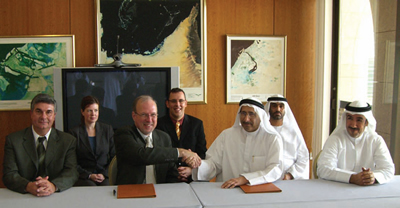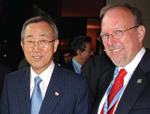The International Dean

“We made a conscious decision to partner with some of the top business schools in the world.”
The first clue that the then new Dean had an international focus may have been the flags that appeared one day in the Atrium of Goodes Hall shortly after his arrival in July 2003. They represented the 20 countries that QSB students could then visit on international exchange. The clocks, showing local times in Beijing, London and Abu Dhabi, among others, soon followed. Both were colourful additions to what is now called the BMO Financial Services Atrium, but interior design wasn’t the aim. Dean David Saunders wanted to convey the message that Queen’s School of Business was about to go global. “The flags and clocks were symbols that definitely served their purpose,” David recalls. “They were a bit of an ice-breaker when I started making the rounds to meet with faculty, staff, students and university colleagues.”
His first message to the QSB family (in Inquiry, Summer 2003) gave an indication of his management philosophy: “I’ve learned several important lessons in my previous positions (Dean of the University of Calgary’s Haskayne School of Business, Associate Dean and Director of the MBA Japan Program at McGill), the most important of which may be that business schools need to be very strategic in the highly competitive sector of advanced education.”
It wasn’t surprising that his message in the next issue emphasized a new mission statement as part of the School’s strategic plan: “To develop outstanding leaders with a global perspective and create new knowledge that advances business and society.” See the updated Strategic Framework »
“One of the things about Queen’s School of Business that attracted me was its stellar reputation and its leadership position in Canadian business education,” David explains. “The challenge we faced was that we weren’t well known outside of Canada. In an increasingly globalized world, with employment opportunities for our graduates stretching to the four corners of the globe, maintaining a strictly national profile was limiting our students’ and alumni options.”
He quickly began to lay the groundwork to address these challenges with a strategy to increase QSB’s international partnerships. “In this business, you’re very much known by the company you keep. So we made a conscious decision to partner with some of the top business schools in the world,” he explains.
With the support of faculty and the School’s Advisory Board, David began preparing to bring in top international partners. One of his first steps was to establish the Centre for International Management in 2004, recognizing that an appropriately resourced centre was required in order to expand the program and attract top level partners.
In 2004, 51% of the third-year Commerce class went on exchange, with half the class missing out on the international exchange experience. More partners were needed to meet the demand at the undergraduate level and to open up opportunities for international study to graduate students. Meanwhile, European business schools were in the market for international partners as a result of wide-sweeping reform of the European education systems known as the Bologna Accord.
Students from any one of 40 countries may be seen sipping lattes or cramming for exams in the Atrium.
The introduction of Queen’s Master of Management, Global Management (MGM) program in 2006 was another example of the School’s new direction. In addition to an in-depth international business curriculum, the program also requires a term of study overseas at one of QSB’s partner schools as part of an international group project. Within a year of its launch, the program expanded to offer students a double degree option whereby students can earn two Masters degrees – one from Queen’s and one from an international partner.
Under David’s leadership, international study opportunities were extended to students in other programs. Full-time MBA students can now choose from 20 international exchange partners, while Executive MBA students can participate in an international study component, most recently offered at the China Europe International Business School (CEIBS) in Shanghai. This is in addition to the compulsory EMBA Global Business Project that requires students to travel anywhere in the world outside the US and Canada to complete a team project.
Meanwhile, the Cornell-Queen’s Executive MBA integrates a cross-border perspective from Day One with classmates in various cities in the US and Canada and faculty from both schools sharing teaching duties.
 from left, Tom Anger, Executive Director of Queen's Executive Development Centre, Amber Wallace, QSB Director of Communications, David Saunders, Prof. Clinton Free, His Excellency, Sultan Bin Nasser al Suwaidi, Governor of the Central Bank of the UAE, with bank officials.QSB has gone much farther afield in extending its brand with the opening of an executive education facility in the United Arab Emirates in 2007, the first Canadian business school to do so. Through partnerships with the Dubai International Finance Centre and Oman’s College of Banking and Financial Studies, Queen’s Executive Development Centre continues to offer its programs in the MENA (Middle East and North Africa) region. These include custom programs for employees of the Saudi Industrial Development Fund who study in Kingston to complete courses for credit. Since the program’s launch in 2007, several of these students have gone on to enroll in the full-time MBA program.
from left, Tom Anger, Executive Director of Queen's Executive Development Centre, Amber Wallace, QSB Director of Communications, David Saunders, Prof. Clinton Free, His Excellency, Sultan Bin Nasser al Suwaidi, Governor of the Central Bank of the UAE, with bank officials.QSB has gone much farther afield in extending its brand with the opening of an executive education facility in the United Arab Emirates in 2007, the first Canadian business school to do so. Through partnerships with the Dubai International Finance Centre and Oman’s College of Banking and Financial Studies, Queen’s Executive Development Centre continues to offer its programs in the MENA (Middle East and North Africa) region. These include custom programs for employees of the Saudi Industrial Development Fund who study in Kingston to complete courses for credit. Since the program’s launch in 2007, several of these students have gone on to enroll in the full-time MBA program.
Snippets of conversations in Italian, Spanish and Arabic are often heard when strolling through Goodes Hall as classes are changing over. Students from any one of 40 countries may be seen sipping lattes or cramming for exams in the Atrium. The atmosphere is definitely cosmopolitan – a singular change from an earlier era when the student body was more homogeneous.
Angela James, the current Director of QSB’s International Management Centre, sees first-hand how the international exchange program has made its mark on the School and its students.
“For some students, their international exchange is their first opportunity to go abroad and it often opens their eyes to a world of possibilities,” she says. “Others who may have travelled before, tend to broaden their understanding of the world beyond Canada. Overall, we see a positive change in the students when they return from overseas. They are more self-aware, mature, independent and confident – all traits that are not easily taught in the classroom.”
Business Law Professor Peter Kissick’s classes regularly include international exchange students. “Many exchange students come from civil law countries and are frequently dumbfounded by the peculiarities of the common law. They often ask some of the most probing and critical questions about the topics at hand. This provides the Canadian students, who might simply take the nature of our legal system for granted, a glimpse into the reasons why the law is the way it is. Having exchange students in the classes I teach has been a pleasure, from both a personal and pedagogical point of view.”
 David Saunders at the 2007 UN Global Compact Leaders Summit in Geneva with UN Secretary-General Ban Ki-moon The Dean is often teased about his affection for his Blackberry. He’s often seen reading emails while navigating the corridors and pathways on campus. Little wonder it’s become such an integral part of his life; his ‘Contacts’ list contains hundreds of names of colleagues from business schools in Canada and around the world. As a past board member of AACSB, the world’s largest business school accreditation body, CEIBS board member, and current Vice President of the European Foundation for Management Development, David’s network of international contacts is vast. These relationships have proven invaluable in spreading the word about Queen’s School of Business and in negotiating new partnership agreements with top-tier schools.
David Saunders at the 2007 UN Global Compact Leaders Summit in Geneva with UN Secretary-General Ban Ki-moon The Dean is often teased about his affection for his Blackberry. He’s often seen reading emails while navigating the corridors and pathways on campus. Little wonder it’s become such an integral part of his life; his ‘Contacts’ list contains hundreds of names of colleagues from business schools in Canada and around the world. As a past board member of AACSB, the world’s largest business school accreditation body, CEIBS board member, and current Vice President of the European Foundation for Management Development, David’s network of international contacts is vast. These relationships have proven invaluable in spreading the word about Queen’s School of Business and in negotiating new partnership agreements with top-tier schools.
Another section of his ‘Contacts’ list contains the coordinates of the 40 members of the School’s newly formed Global Council. Comprised of alumni and friends of the School based in the US and overseas, this group is uniquely placed to identify opportunities for QSB to expand its presence and reputation globally. “My interactions with Global Council members and visits with alumni at international Queen’s Business Club events and informal visits have been invaluable in terms of intelligence-gathering,” David says. “I always welcome their advice, and enjoy hearing about their memories of Queen’s.”
His travels continue, as building the Queen’s School of Business brand is important business. “Our international reputation is growing with each new partnership agreement we sign,” David explains. “We plan to continue to push the envelope in getting the word out that Queen’s School of Business is a competitor on the world stage. We’ve always known we’re a top-tier institution. It’s time the rest of the world finds out as well.”
THEN AND NOW 2002/03 2010/11 29 # of international exchange programs QSB students can choose from 118 29 # of international partners 82 102 or 51% # or % of Commerce students on exchange 244 or 82% 102 # of QSB students in all programs on exchange 291 15 # of countries where students can study on exchange 34 204 # of incoming and outgoing exchange students in all programs 600